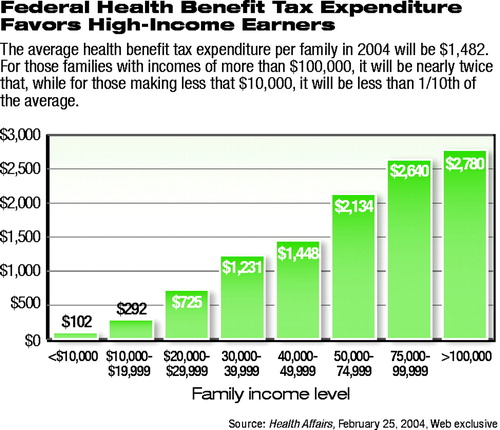Health-Related Tax Breaks Favor Wealthy Workers
Tax benefits for health insurance favor those with higher incomes, according to an analysis in the February issue of the journal Health Affairs.
John Sheils, vice president of the Lewin Group Inc., and Randall Haught, a senior scientist there, estimate that the tax expenditure for health benefits in 2004 will be $188.5 billion in 2004.
They define the term tax expenditures as the amount of revenue that the federal government foregoes by exempting certain health benefits and spending from the federal income and Social Security taxes. Or, more simply, it is the amount of money the federal government loses because it grants certain health-related tax exemptions.
Those items include employer health benefit contributions for workers and retirees. For 2004 the authors estimated that employers will pay about 77 percent of the cost of employer-sponsored coverage. The value of these benefits is not taxable to the employees.
The authors noted, “It is important to understand that the tax expenditure for health benefits accrues to workers rather than employers.”
Other items that help produce that $188.5 billion figure are tax deductions for out-of-pocket health spending that exceed 7.5 percent of adjusted gross income, health-benefit deductions for the self-insured, and reimbursement accounts through which out-of-pocket health costs can be paid in pretax dollars.
 Sheils and Haught estimate that the average health benefit tax expenditure will be about $1,482 per family in 2004. However, the rewards of the tax exemption accrue largely to high-income groups (see chart above).
Sheils and Haught estimate that the average health benefit tax expenditure will be about $1,482 per family in 2004. However, the rewards of the tax exemption accrue largely to high-income groups (see chart above).
Families with annual incomes of $100,000 or more will gain an average of $2,780, but families with incomes of less than $10,000 will gain an estimated $102.
Only 28.4 percent of all tax expenditures in 2004 will go to families with incomes below $50,000, even though this group contains 57.5 percent of families in the United States.
The authors wrote that the “results raise important equity issues concerning the current distribution of tax benefits.”
Given the fact that more than 43 million Americans are uninsured, the authors asked “whether it is appropriate that 26.7 percent of federal health benefits tax expenditures goes to the 14 percent of the population with the highest incomes.”
The article, “The Cost of Tax-Exempt Health Benefits in 2004,” can be accessed for a fee at www.healthpolicy.org. ▪



